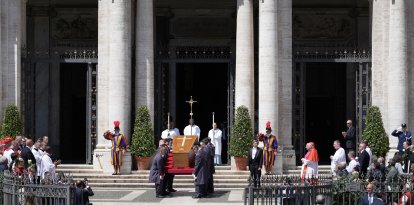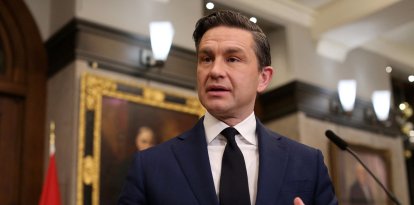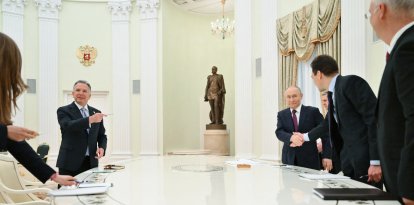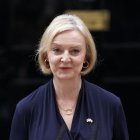Keir Starmer becomes new UK prime minister after Labour's victory in the elections
The Tories leave Downing Street after 14 years in power with the worst historical result since its foundation.
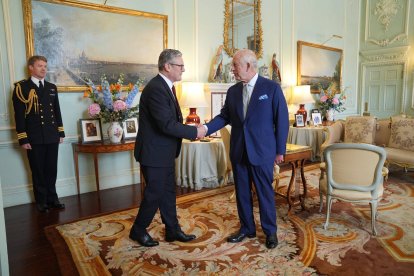
King Charles III of the United Kingdom meets with new Prime Minister Keir Starmer at Buckingham Palace on July 5, 2024
Labour won in a landslide victory on Thursday in the British legislative elections, which will put an end to 14 years of Conservative governments and open a stage of "change," said its leader, Keir Starmer, the next prime minister.
While the counting of votes continues (at the time of publishing there are still two races to be decided), Labour secured the absolute majority, for which it needed to reach 326 seats, after reaching the figure of 340 contested.
The initial estimates of a BBC exit poll project the Labour Party to win a comfortable 412 of the 650 seats in the House of Commons, a comfortable lead over the Conservatives led by Prime Minister Rishi Sunak, chastened by voters, who are only projected to get 131.
The Conservative Party's 121 confirmed seats is the worst result in an election since the party's founding in 1834, down from the 156 achieved in 1906, its previous low, while Labour's numbers fall just short of Tony Blair's historic supermajority (418) in 1997.
"The voters have spoken and they are ready for change, to end show politics and return to politics as a service to the citizenry," Starmer, 61, said in a speech after his reelection as a member of Parliament in his north London constituency.
"It is up to us to deliver on our promises," added the Labour Party leader, who will take his first steps on the international stage next week at a NATO summit in Washington.
Nigel Farage's political party, one of the driving forces behind Brexit, is projected to win just 13 seats, although other estimates had a lower number, falling behind the centrist Liberal Democratic Party, which would get 61.
"The revolt against the establishment is on," Farage, 60, who achieved the M.P. seat on his eighth attempt, said on X.
The Scottish independence supporters, third in the 2019 election, suffered a major setback with just 10 seats won in the 57 constituencies in which they contested.

World
United Kingdom: exit polls show complete triumph for the Labour Party
Emmanuel Alejandro Rondón
Swing to the center
Starmer, who moved his party closer to more centrist positions after the 2019 election defeat of his more left-leaning predecessor Jeremy Corbyn in the 2019 election, campaigned for less radical "change" than his predecessor.
Corbyn, 74, expelled from the Labour Party after accusations of antisemitic stances, renewed his seat, winning first place in his Islington North constituency in London.
Starmer promised cautious management of the economy, as part of a long-term growth plan that includes boosting criticized public services, particularly the reviled health system.
With some polls casting doubt on his reelection as an M.P., the Conservative leader, Rishi Sunak, retained his seat by winning his constituency in Richmond in northern England.
"The Labour Party has won this election. The British people gave a clear verdict and I take responsibility. Today, power changes hands, peacefully and orderly with goodwill on all sides," Sunak said.
The Conservative leader leaves office less than two years after he was appointed prime minister in October 2022, when he took over after a disastrous, 49-day tenure of Liz Truss, who had replaced Boris Johnson, embroiled in the scandal of having parties at his official residence during the COVID-19 pandemic.
The Conservative Party, with infighting and mired in a deep crisis, had been in power since May 2010, first with David Cameron as prime minister, followed by Theresa May and then Johnson.
Brexit, in 2020, and its consequences for the British economy, COVID, the rising cost of living and a criticized National Health Service with long wait times ended up taking their toll on the Conservatives.
Which members of the Conservative Party lost their seats?
Starmer will try to reassure voters, following Sunak's repeated accusations that a Labour victory would "translate into higher taxes for a generation."
The Labour leader, who will be tasked by King Charles III on Friday to form a government, four years after taking the reins of the party and nine years after entering politics, sought to brush off fears created by Sunak.
"There will be no increase in income tax, social security or VAT," he replied shortly before the election, insisting that he will only raise rates on certain taxpayers, including private schools or companies in the hydrocarbon sector, but not on workers.
Starmer has already announced that he will abandon the Conservative project of chartering planes to Rwanda with illegal migrants to combat the massive arrivals of people crossing the English Channel, which separates England and France.
Update: Keir Starmer meets with King Charles III to seek his approval and form his government
RECOMMENDATION
